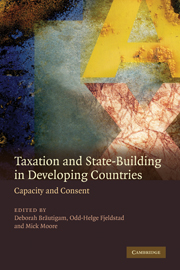Book contents
- Frontmatter
- Contents
- List of figures and tables
- List of contributors
- Acknowledgements
- 1 Introduction: taxation and state-building in developing countries
- 2 Between coercion and contract: competing narratives on taxation and governance
- 3 Capacity, consent and tax collection in post-communist states
- 4 Taxation and coercion in rural China
- 5 Mass taxation and state–society relations in East Africa
- 6 Contingent capacity: export taxation and state-building in Mauritius
- 7 Tax bargaining and nitrate exports: Chile 1880–1930
- 8 Associational taxation: a pathway into the informal sector?
- 9 Rethinking institutional capacity and tax regimes: the case of the Sino-Foreign Salt Inspectorate in Republican China
- 10 Tax reform and state-building in a globalised world
- References
- Index
8 - Associational taxation: a pathway into the informal sector?
Published online by Cambridge University Press: 22 September 2009
- Frontmatter
- Contents
- List of figures and tables
- List of contributors
- Acknowledgements
- 1 Introduction: taxation and state-building in developing countries
- 2 Between coercion and contract: competing narratives on taxation and governance
- 3 Capacity, consent and tax collection in post-communist states
- 4 Taxation and coercion in rural China
- 5 Mass taxation and state–society relations in East Africa
- 6 Contingent capacity: export taxation and state-building in Mauritius
- 7 Tax bargaining and nitrate exports: Chile 1880–1930
- 8 Associational taxation: a pathway into the informal sector?
- 9 Rethinking institutional capacity and tax regimes: the case of the Sino-Foreign Salt Inspectorate in Republican China
- 10 Tax reform and state-building in a globalised world
- References
- Index
Summary
Introduction
The informal sector is large in most developing countries. It typically comprises most of the labour force. Equally typically, governments obtain little tax revenue from this sector and even less direct tax revenue. Those are statements of the obvious: exclusion from the tax net is a defining characteristic of informality.
Is this a problem? Should governments be putting more emphasis on expanding their tax take from the informal sector? There is no consensus on the answer to those questions. Most professional tax specialists tend to be sceptical on pragmatic grounds. Why chase after a sector where the direct costs of collection will be high in relation to the revenue raised, and where the costs of compliance might weigh heavily on the taxpayers themselves? The sceptical policy prescription, which accords closely with the advice emanating from influential organisations such as the International Monetary Fund (IMF), is to focus on the shorter term and on large individual taxpayers. In the longer term, it is expected that indirect taxes, especially the Value Added Tax (VAT), that has been introduced into most countries over the last three decades, will gradually insinuate themselves deeper and deeper into the informal economy.
Proponents of more focused attempts to extend taxation to the informal sector make an equally pragmatic argument: in so far as economies of developing countries are becoming increasingly informalised, policy-makers will have to find ways to tax this sector if the formal sector is not to bear an oppressive burden.
- Type
- Chapter
- Information
- Taxation and State-Building in Developing CountriesCapacity and Consent, pp. 183 - 211Publisher: Cambridge University PressPrint publication year: 2008
- 27
- Cited by



